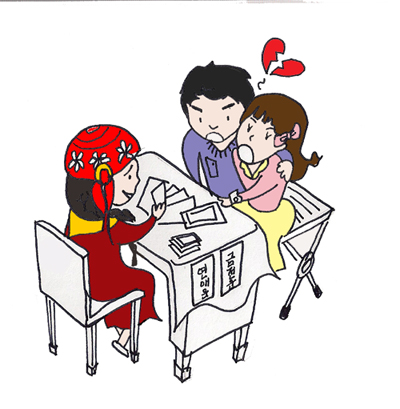What 100 Yonseians think about a “lucky” life
SOMETIMES WE can’t let go of the feeling that an invisible force causes us to have an unusually good or bad day. This invisible force exerts its influence on a wider scale, too. Michelle Kwan never had the luck of winning the gold medal at the Olympics; meanwhile, Bill Gates got to make full use of his knack for software just as PCs were about to become widely available to the public. To see how luck effects Yonseians, The Yonsei Annals asked 100 Yonseians what they think about luck, and what sorts of experiences they have had with fortunetelling and jinxes.
Do you consider yourself as lucky?
The bus that used to come frequently does not arrive when you are anxiously waiting for it, late for school. Such a coincidence is referred to as Murphy’s law, which dictates that “Whatever can go wrong will go wrong.” The opposite of Murphy’s law is Sally’s law, derived from the American movie When Harry Met Sally (1989), in which everything suddenly works out in the end for the heroine Sally. So it is when, even though one did not study for a test at all, the terms one saw by chance right before the test happen to appear on the short answer questions.
To find out whether Yonseians perceive themselves to be lucky or unlucky, the Annals asked whether they have had experiences that can be explained by either Murphy’s law or Sally’s law. A total of 74 Yonseians replied that they have experienced Murphy’s law, while 64 Yonseians have experienced Sally’s law. More respondents, however, said that they have faced bad luck than good luck, indicating that people tend to remember bad coincidences better than good ones. In other words, when asked whether they regard themselves as lucky, most Yonseians would say, “Not really.”
Have you ever consulted a fortuneteller?
A majority of Yonseians have experienced both lucky and unlucky situations, but as the above results show, people tend to feel unlucky more often. This corresponds with the result that 94 Yonseians said “yes” to the question about whether luck also plays a part in bringing about good results. Yet, despite the overwhelming response that luck is an important factor, 54 Yonseians replied that they have not consulted fortunetellers after entering university. 38 out of these 54 respondents said that the main reason for not visiting a fortuneteller is that it is not very convincing. While acknowledging that unexplainable coincidences do exist, more than half of Yonseians are reluctant to merely rely on the uses of the birth year, month, day and hour as in saju or the peculiar images on tarot cards to predict the future.
Why did you go to a fortuneteller?
While a considerable number feel that fortunetelling is not very reliable, those who have once consulted a fortuneteller did not seem to take it very seriously either. Out of the 46 students who have once consulted a fortuneteller, 37 replied that they visited the fortuneteller “for fun.” Also, asked where they went to have their fortune told, 35 respondents answered that they went to saju/tarot cafes or booths. These cafes and booths are indeed more accessible; many of them line the streets near Shinchon Station and are somewhat less creepy than professional jeomjip (fortuneteller’s house). However the fortunetelling at cafes or stands is not a total bluff either, as more than half of the 46 students (24) who had experience with fortunetelling replied that what they were told was pretty much accurate. Hence, fortunetelling at such places can provide a viable distraction from a hectic life.

What fortune are you most curious about?
Regardless of whether you believe that fortunetelling is reliable, let us suppose that you have been given a chance to have your fortune told about one part of your life. What fortune would you choose to hear? The top rated answer was one’s fortune in finding love (34), followed by wealth (21). During the bloom of youth, having a relationship is certainly a valuable experience. And it would be amusing to imagine your potential lover based on what you are told by the fortuneteller about him or her, such as when you will meet your boyfriend or girlfriend and what his or her personality will be like.
At the same time, it is interesting that the issues students tend to care the most about, such as schoolwork and employment, received the fewest responses. The previous month’s Enquete on stress showed that many Yonseians are actually very concerned about these issues; 40 out of 102 Yonseians felt their academic major and career issues were the most distressing issues in their lives, while only 10 Yonseians chose love issues as the greatest source of stress. When it comes to fortunetelling, though, many students would ask about their prospects of meeting their soul mate or becoming rich, which are, in some ways, more abstract and less urgent issues, which do not need to be taken very seriously. This is related to the fact that many students do not feel that fortunetelling is reliable and that they consult fortunetellers for amusement.
Do you have any jinxes during the exam period?
The word jinx, queer as it sounds, originates from the Latin word iynx, the wryneck bird that has occasionally been used in magic and divination. Some unexplainable negative occurrences are referred as jinxes, and people try to avoid them as best as they can. The Annals asked Yonseians about their jinxes and the things they do to have as much luck as possible during the exam period. Unexpectedly, despite the fact that nearly all of the respondents believe in luck, only 17 Yonseians replied that they have such jinxes and habits. What is noteworthy, though, is that these 17 respondents have both a certain number of habits in common and also some habits that are completely opposed. A common habit was taking the exam with the same pen used to study the subject. Also, some people had to wash their hair before the exam, while others had to avoid doing so, lest the exam results turn out poorer than expected. At the same time, just as quite a few Yonseians depend on fortunetelling to attain good luck, Yonseians are not that concerned about particular jinxes.

* * *
Some people seem to have the uncanny ability to be at the right place at the right time. What is the key to become such a lucky person? Richard Wiseman, author of “Quirkology,” mentions in his book, The Luck Factor, four principles to create good fortune: maximize chance opportunities, listen to lucky hunches, expect good fortune, and turn bad luck into good luck. Thus it is up to the person’s positive and active attitude to pick up as much fortune as possible. “Fortunately,” most Yonseians have the same idea, not being so bothered by fortunetelling or jinxes. As the saying goes, “Heaven helps those who help themselves.”
Shin Joo-hyung
redflower1126@yonsei.ac.kr

